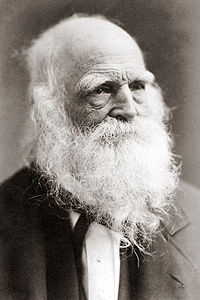Analysis of The Hurricane
William Cullen Bryant 1794 (Cummington) – 1878 (New York City)
Lord of the winds! I feel thee nigh,
I know thy breath in the burning sky!
And I wait, with a thrill in every vein,
For the coming of the hurricane!
And lo! on the wing of the heavy gales,
Through the boundless arch of heaven he sails;
Silent and slow, and terribly strong,
The mighty shadow is borne along,
Like the dark eternity to come;
While the world below, dismayed and dumb,
Through the calm of the thick hot atmosphere
Looks up at its gloomy folds with fear.
They darken fast; and the golden blaze
Of the sun is quenched in the lurid haze,
And he sends through the shade a funeral ray--
A glare that is neither night nor day,
A beam that touches, with hues of death,
The clouds above and the earth beneath.
To its covert glides the silent bird,
While the hurricane's distant voice is heard,
Uplifted among the mountains round,
And the forests hear and answer the sound.
He is come! he is come! do ye not behold
His ample robes on the wind unrolled?
Giant of air! we bid thee hail!--
How his gray skirts toss in the whirling gale;
How his huge and writhing arms are bent,
To clasp the zone of the firmament,
And fold at length, in their dark embrace,
From mountain to mountain the visible space.
Darker--still darker! the whirlwinds bear
The dust of the plains to the middle air:
And hark to the crashing, long and loud,
Of the chariot of God in the thunder-cloud!
You may trace its path by the flashes that start
From the rapid wheels where'er they dart,
As the fire-bolts leap to the world below,
And flood the skies with a lurid glow.
What roar is that?--'tis the rain that breaks
In torrents away from the airy lakes,
Heavily poured on the shuddering ground,
And shedding a nameless horror round.
Ah! well known woods, and mountains, and skies,
With the very clouds!--ye are lost to my eyes.
I seek ye vainly, and see in your place
The shadowy tempest that sweeps through space,
A whirling ocean that fills the wall
Of the crystal heaven, and buries all.
And I, cut off from the world, remain
Alone with the terrible hurricane.
| Scheme | AABB CCDDEEFF GGHHXXIIJJ XIKKXILL MMNNOOPP QQJJRRLLSSBB |
|---|---|
| Poetic Form | Etheree (24%) Tetractys (20%) |
| Metre | 11011111 111100101 01110101001 10101010 0110110101 1010111011 100101001 01011101 101010011 101010101 101101110 111110111 110100101 1011100101 01110101001 011110111 011101111 010100101 111010101 101010111 100010101 0010101001 11111111101 11011011 10111111 1111100101 111010111 1101101 011101101 11011001001 10110011 0110110101 011010101 101001100101 11111101011 101011011 10101110101 010110101 111110111 0100110101 1001101001 010010101 111101001 10101111111 1111001011 0100101111 010101101 1010100101 011110101 011010010 |
| Closest metre | Iambic pentameter |
| Characters | 1,997 |
| Words | 382 |
| Sentences | 24 |
| Stanzas | 6 |
| Stanza Lengths | 4, 8, 10, 8, 8, 12 |
| Lines Amount | 50 |
| Letters per line (avg) | 32 |
| Words per line (avg) | 8 |
| Letters per stanza (avg) | 264 |
| Words per stanza (avg) | 63 |
Font size:
Submitted on May 13, 2011
Modified on April 29, 2023
- 1:55 min read
- 112 Views
Citation
Use the citation below to add this poem analysis to your bibliography:
Style:MLAChicagoAPA
"The Hurricane" Poetry.com. STANDS4 LLC, 2024. Web. 28 Apr. 2024. <https://www.poetry.com/poem-analysis/40357/the-hurricane>.


Discuss this William Cullen Bryant poem analysis with the community:
Report Comment
We're doing our best to make sure our content is useful, accurate and safe.
If by any chance you spot an inappropriate comment while navigating through our website please use this form to let us know, and we'll take care of it shortly.
Attachment
You need to be logged in to favorite.
Log In